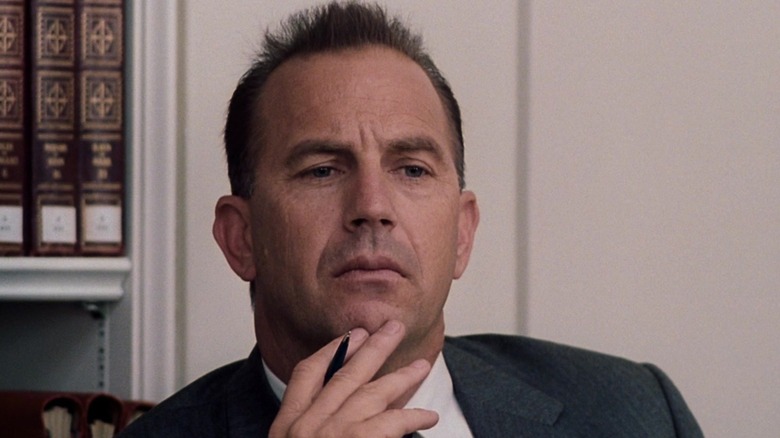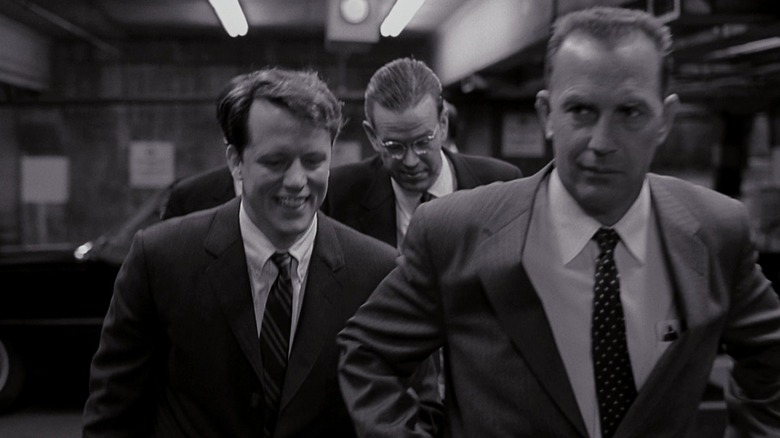An Underrated Kevin Costner Flop Was Almost Directed By Francis Ford Coppola
If you asked me to name the 10 most buzzed about screenplays of my lifetime, i.e. scripts that were considered so brilliantly crafted that they seemed like can't-miss blockbusters and/or Oscar contenders, David Self's "Thirteen Days" would be near the top of my list. A suspenseful page-turner about the 1962 Cuban Missile Crisis, where President John F. Kennedy and his advisers won a nearly apocalyptic game of brinkmanship with the U.S.S.R. over the latter's deployment of nuclear missiles in Cuba, it immediately captured the attention of A-list directors and movie stars. Steven Spielberg considered it. So did Lawrence Kasdan.
With Kevin Costner attached to produce and play the lead role of Kenneth O'Donnell (a Special Assistant to JFK), it soon became clear that a director with whom Costner was familiar would likely get the gig. It looked for a while that Phil Alden Robinson, who made film history with Costner via the dad-movie classic "Field of Dreams," might reunite with his cornfield-baseball buddy, but creative differences kiboshed this. Roger Donaldson, the Australian helmer who'd helped turn Costner into a white-hot sex symbol with the taut political thriller "No Way Out," was also eyed, as was Martin Campbell (who, despite having never directed the star before, was highly in demand after he resuscitated the James Bond franchise with "GoldenEye").
There was nothing wrong with Donaldson or Campbell, but "Thirteen Days" was such a hot screenplay. Surely, the film's producers could get an A-lister to direct one of the biggest stars in the world in a movie that could very well be a serious Oscar contender. So, Costner and Beacon Communications reached out to Francis Ford Coppola. Why did this not come to pass? And how did turning down "Thirteen Days" set Coppola down the (very long) path to making the biggest flop of his career?
How a Star Wars prequel cost Thirteen Days the services of Francis Ford Coppola
Coppola was taking mostly paycheck gigs in the late 1990s, which led to him making arguably his very worst movie ("Jack") and one terrific legal thriller ("The Rainmaker"). "Thirteen Days" was by far the best material he'd been offered in ages, but it was more of a walk-and-talk drama. He would be serving the material rather than making it his own. He would also be working with an Oscar-winning actor-director who was known for diva behavior (which didn't go down well with Clint Eastwood on the set of "A Perfect World").
Coppola ultimately declined, but not because he was worried about Costner throwing his weight around. I mean, this might've been a concern, but the turning point was, per a 1999 report from Ain't It Cool News (which I can personally verify), an early screening of his pal George Lucas' "Star Wars: Episode I — The Phantom Menace." Once he saw what Lucas was able to accomplish in terms of computer-generated world-building, he moved a project called "Megalopolis" onto the front burner. The time to make his brazen epic about a civilization on the brink was now (or so he thought).
Costner and Beacon finally went with Donaldson, who delivered the B+ version of what could've been an A movie in the right hands. Despite good reviews, the movie was completely ignored by the Academy Awards and, worse, grossed $67 million against an $80 million budget. Coppola wouldn't have turned this into "The Godfather," but he absolutely would've had fun casting it. That could've made all the difference. Given that he wouldn't make another feature until 2007's "Youth Without Youth," this feels like a missed opportunity.

